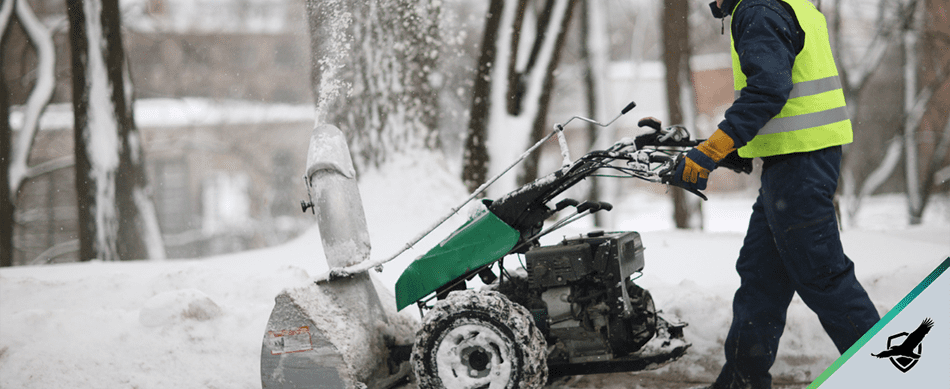Snow Blower Safety Tips

Arctic blast, polar vortex, snowmageddon, and bombogenesis may sound like something out of your favorite science fiction movie, but they’re winter realities for much of the U.S. There is something awe-inspiring about extreme winter weather. There’s also
something awe-inspiring about moving a ton of snow out of your driveway.
Every winter, snow blowers save the backs of thousands
of people. You can clear a driveway and walkway much faster with a snow blower than you can with a shovel. And although you can spend a lot on a snow blower, you can also find a new one for under $200.
There are drawbacks, though, especially
when we ignore snow blower safety protocols. In fact, The Washington Post reports that “roughly 9,000 Americans have lost a finger (or two, or three) to a snow blower-related injury” over a 12-year period.
There are some obvious ways to stay
safe when you use your snow blower, such as turning it off before performing any maintenance or keeping children away from an operating snow blower. Other safety tips aren’t quite as obvious, and some may even come as a surprise.
1. Never, ever unclog the chute with your hand
Even with the power off and the blades stopped, it’s still possible that rotational force is built up just enough for the blade to turn a bit when it is unclogged.
2. Use a tool to unclog the chute
You can’t use your hands, but you can use a tool like a broom handle or a clearing tool to remove clogged snow. Just turn off the engine and wait a few seconds for the blades to stop spinning.
3. Clear a path
Before
the snow gets too deep, remove obstacles like doormats, lawn decor, or anything else that could get caught and damage your snow blower.
4. Dress appropriately
Wear shoes or boots that have good traction to avoid slipping
while you’re working with your snow blower. Consumer Reports also suggests safety
glasses, “and avoid loose-fitting clothes that could get caught in moving parts.” If it’s especially cold out, be sure to dress in multiple layers, as well. There’s no need to risk frostbite while you’re clearing your driveway.
4. Cover your ears
The American Speech-Language-Hearing Association points out that a gas snow blower is loud
enough to cause hearing damage. Use earplugs or noise-reducing headphones when you operate your snow blower.
5. Fuel up
Fill your gas tank before you start your snow blower, otherwise you’ll need to wait for the engine to cool down to add more. This is also a good time to check the oil.
6. Keep it outside
Don’t
run your snow blower in your garage where dangerous carbon monoxide could build up. Keep it outdoors anytime it is on.
7. Take a break
You may have heard that shoveling snow can cause heart attacks, but did you know the same is true for snow blowers? Pushing a snow blower around is hard work, and if you aren’t warmed up and ready for the challenge, you’re
putting a lot of stress on your heart. Take it easy while you’re out there. The snow isn’t going anywhere.
Another option is to take it in shifts. If you’re expecting a lot of snow, go out once before the snow ends, and then again once it is done snowing.
8. Watch the cord
If you’re using an electric snow blower, be sure
you know where the cord is at all times so you don’t accidentally run over it.
9. Aim in the right direction
Point the chute away from cars, people, or other walkways and driveways. If you’re wearing earplugs (and you
should be), pay special attention to people walking nearby so you don’t accidentally hit them with snow.
10. Keep up with maintenance
A properly maintained machine will give you more years of trouble-free service than a neglected machine. Keeping up with maintenance isn’t a direct line to snow blower safety, but a working snow blower will give
you less opportunity to have your hands near potentially moving parts. Plus it will save you a lot of frustration when the snow is piling up and you need your snow blower in prime working condition.
Did you know heavy snow can damage your home? Keep your insurance up to date with Pekin Insurance to make sure you’re covered in case the unexpected happens. Contact your local Pekin Insurance agent today for more details.







